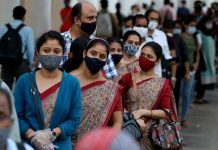Visiting Portugal last week, WHO Regional Director for Europe, Dr Hans Henri P. Kluge, had the opportunity to visit an innovative primary health-care centre and speak with health workers, before meeting with the Minister of Health and officially opening the childhood obesity and COVID-19 conference in Lisbon, Portugal.
Meeting with the Portuguese Minister of Health, Dr Marta Temido, the Regional Director congratulated Portugal on its high rates of COVID-19 vaccination – with more than 80% of the population fully vaccinated, a figure that rises to 98% among the over-60s. Furthermore, Dr Kluge congratulated the country on sharing extra vaccine doses with other countries to boost levels of vaccine coverage.
During the visit Dr Kluge also toured the COVID-19 Vaccination Centre of the University Stadium of Lisbon to see first-hand the continued roll-out of COVID-19 vaccines to citizens.
Addressing childhood obesity
In addition to meeting with the Minister of Health, Dr Kluge attended the Official Opening of the Childhood Obesity and COVID-19 conference. Childhood obesity has fallen significantly in Portugal, making it one of the few countries in the European Region that have reduced these figures.
Childhood obesity remains a big problem in Europe, with evidence suggesting that one in three European children between the ages of six and nine are overweight or obese. Childhood obesity is related to many factors, including lack of access to nutritious and affordable food as well as lack of physical activity.
In addition, emerging evidence suggests that an increase in childhood obesity can be linked to the pandemic, which reduced physical activity and caused school closures and shifts in families’ food-related behaviours.
During the conference Dr Kluge congratulated Portugal and learned about methods that may be successful in reducing childhood obesity elsewhere, such as use of health literacy.
Innovative use of primary health care
Visiting the Unidade de Saúde Familiar da Baixa primary health-care centre, Dr Kluge spoke with health-care professionals. The centre treats many migrants who have settled in Lisbon and offers innovative care, such as walking with a doctor doing physical activity while discussing the patient’s health – for example, improving the diet of diabetic patients.
Another example is the social prescription
programme, where health professionals in the centre interact with the local community and non-profit organizations to provide social support, helping to ensure they address the main roots of ill-health, which are often related to poverty and other social determinants of health. In this case the doctors, nurses, psychologists, social workers, nutritionists, and others work on treating the patient but also addressing these root causes, utilizing other resources in the community.
Primary health-care centres like these have proven vital during the pandemic, supporting the rest of the health system as it dealt with large numbers of COVID-19 patients, and continuing to provide urgent care for other health concerns.
High-level meetings
Dr Kluge also spoke directly with the President of Portugal, Professor Marcelo Rebelo de Sousa. The meeting included discussions on the successes and challenges in fighting the pandemic and the resilience of the Portuguese health system, with its strong use of primary health care and its association with vaccination against COVID-19.
The Regional Director expressed appreciation for Portugal’s solidarity, highlighting the vaccination of more than 600 000 migrants in the country.




























